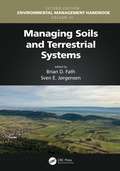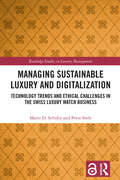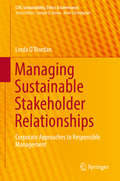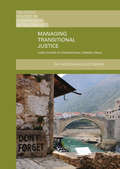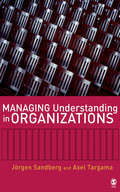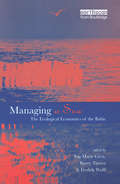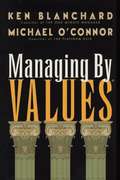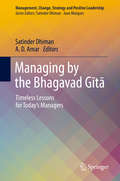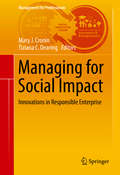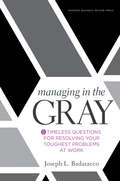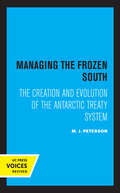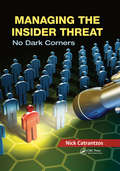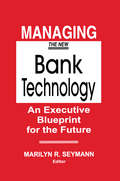- Table View
- List View
Managing Soils and Terrestrial Systems
by Brian D. Fath Sven E. JørgensenBringing together a wealth of knowledge, Environmental Management Handbook, Second Edition, gives a comprehensive overview of environmental problems, their sources, their assessment, and their solutions. Through in-depth entries and a topical table of contents, readers will quickly find answers to questions about environmental problems and their corresponding management issues. This six-volume set is a reimagining of the award-winning Encyclopedia of Environmental Management, published in 2013, and features insights from more than 400 contributors, all experts in their field. The experience, evidence, methods, and models used in studying environmental management are presented here in six stand-alone volumes, arranged along the major environmental systems. Features The first handbook that demonstrates the key processes and provisions for enhancing environmental management Addresses new and cutting-edge topics on ecosystem services, resilience, sustainability, food–energy–water nexus, socio-ecological systems, and more Provides an excellent basic knowledge on environmental systems, explains how these systems function, and offers strategies on how to best manage them Includes the most important problems and solutions facing environmental management today In this third volume, Managing Soils and Terrestrial Systems, the general concepts and processes of the geosphere with its related soil and terrestrial systems are introduced. It explains how these systems function and provides strategies on how to best manage them. It serves as an excellent resource for finding basic knowledge on the geosphere systems and includes important problems and solutions that environmental managers face today. This book practically demonstrates the key processes, methods, and models used in studying environmental management.
Managing Sports Teams: Economics, Strategy and Practice (Management for Professionals)
by Stefan Walzel Verena RömischThis handbook offers a comprehensive overview of the most important and fundamental elements for the management of team sports organisations. It is intended to meet the needs of full-time and voluntary individuals in management positions in professional and semi-professional sports clubs, leagues and federations, and those who aspire to such positions. In addition to management-relevant aspects, its interdisciplinary approach also includes the basics of law and media, which are vital to the successful management of team sports organisations. Bringing together experts from the respective disciplines, the book’s content is presented in a clear and straightforward manner, facilitating its implementation in practice.
Managing Sustainability
by Alan S. GuttermanManaging Sustainability is a comprehensive guide to governing, leading, and managing a successful sustainability-focused business. Being a socially and environmentally responsible business is a worthy goal for many people; however, turning the goal into reality is a daunting process. This book takes a clear and practical approach to the “nuts-and-bolt” of achieving this goal, and covers steps to be taken by directors and executives to create and implement appropriate strategies, policies, and management systems. It recognizes that corporate social responsibility (“CSR”) is like any other important management initiative and requires proactive leadership from the top of the organization. Key topics include: • Understanding how CSR is changing the traditional fiduciary duties of directors and officers • Developing and implementing internal governance instruments to provide a foundation for decision-making around CSR • Integrating CSR into the duties and responsibilities of the chief executive officer and other members of the C-suite team, as well as into their compensation arrangements • Conducting continuous audits and assessments of the sustainability governance and management framework using certification and rating systems to evaluate and improve CSR performance and effectiveness Current and aspiring leaders wishing to build a sustainability-centered business will appreciate the straightforward and actionable guidance offered by this book.
Managing Sustainable Luxury and Digitalization: Technology Trends and Ethical Challenges in the Swiss Luxury Watch Business (Routledge Studies in Luxury Management)
by Peter Seele Mario D. SchultzThis book offers new transdisciplinary perspectives on luxury, exploring the topical phenomenon of digitally retouched (censored) and blockchain-secured (sensored) luxury watches and outlining implications that emerge for the field of luxury studies and managerial practice.Based on a cross-disciplinary approach, the book integrates theoretical and empirical perspectives to advance the readers’ understanding of luxury. With a particular focus on the Swiss luxury watch context, the book thereby draws on qualitative, quantitative, and archival data to shed new light on recent luxury trends, integrating literature on aesthetics of labour, conspicuous consumption, Gestalt theory, ethical theory, functional theories of attitudes, and surveillance studies. Eight chapters take the readers through a range of topical challenges arising with the display and changing moral perceptions of luxury and shifts that the luxury watch sector is facing in light of the digital transformation impacting luxury goods and the luxury management environment.This unique book will be of value for academics, scholars, and upper-level students across management studies with a particular interest in the luxury and fashion industries, luxury management, brand management, business ethics, and digital transformation.With a foreword by Thomaï Serdari, Leonard N. Stern School of Business, New York University.
Managing Sustainable Performance and Governance in Higher Education Institutions: A Dynamic Performance Management Approach (System Dynamics for Performance Management & Governance #5)
by Federico CosenzThe fast-changing evolutionary process of global Higher Education systems systematically poses new challenges related to the appearance of innovative elements that lead academic governing bodies to question current managerial structures and methods. Due to this, theory and practice have gathered multiple contributions and experiences to support and further develop this evolutionary pathway during the past decades. Global competitiveness, economic and social growth are driven worldwide by knowledge and innovation. In this context, Higher Education Institutions play a crucial role as they primarily contribute to knowledge transfer and development and, as a result, foster regional development, employment, and economic wealth. The relevance of this role leads Universities to explore alternative solutions for managing their performance according to a sustainable perspective. This book draws on this flourishing debate on Higher Education policy and management and investigates an innovative systemic perspective to design and implement sustainable performance management systems for academic institutions. The conditions for the success of Universities, the critical issues underlying the creation of academic value, the dynamic complexity characterizing academic governance settings, the pluralistic audience of stakeholders and related expectations, the causal interplays between organizational performance variables, represent some of the central themes around which this work is developed. More specifically, the book suggests and discusses the adoption of a Dynamic Performance Management approach to frame the inherent organizational complexity of Higher Education Institutions, thus supporting a strategic learning perspective to design and implement relevant performance measures. This approach originates from the combination between conventional performance management and System Dynamics modeling. Many research and practice contributions prove that this methodological combination can boost the understanding and interpretation of value creation processes by identifying and exploring the causal connections amongst strategic resource allocation and consumption, corresponding performance drivers, emerging outputs, and outcomes. To test the effectiveness of this approach in University settings, a wide range of examples is offered in each book chapter. This allows readers to explore the advantages, limitations, and practical implications of adopting Dynamic Performance Management in Higher Education Institutions, as well as guide academic decision-makers towards a more robust approach to design and implement strategic management mechanisms in Universities.
Managing Sustainable Stakeholder Relationships: Corporate Approaches to Responsible Management (CSR, Sustainability, Ethics & Governance)
by Linda O'RiordanThis book examines corporate approaches to responsible management by investigating the stakeholder relationships between business and society. Though concepts of responsible management continue to evolve, its key objective is to explore the opportunities and dilemmas which business decision-makers face when attempting to reconcile their organisation’s interests with those of other stakeholder groups. In this intensely debated field, it focuses on the power of entrepreneurial purpose and the opportunities which emerge when corporate choices and actions are driven by connected stakeholder interests. A case study of the pharmaceutical industry in the UK and Germany is presented to reveal how decision-makers in this particular sector are responding to their context-specific management challenges. The research findings are subsequently employed to examine and revise a pre-specified stakeholder management framework which was previously developed by the author. The proposed updated framework is the book’s main conceptual contribution. By depicting a set of inclusive, integrated, and inter-related steps, it is intended to provide an innovative, comprehensive, practical toolkit for stakeholder management. As such, it is designed to help decision-makers to attain the greatest possible outcome from the resources they invest by consciously basing their choices not merely on the impacts for their shareholders, but also and more holistically for a broader range of stakeholders. Ultimately, the book demonstrates how optimally harmonised stakeholder management can serve as a powerful catalyst for unlocking viable business opportunities which serve the interests of business and society.
Managing Testimony and Administrating Victims
by Juan Pablo Aranguren RomeroThis book analyzes the implementation of Law 975 in Colombia, known as the Justice and Peace Law, and proposes a critical view of the transitional scenario in Colombia from 2005 onwards. The author analyzes three aspects of the law: 1) The process of negotiation with paramilitary groups; 2) The constitution of the Group Memoria Histórica (Historic Memory) in Colombia and 3) The process of a 2007 law that was finally not passed. The book contains interviews with key actors in the justice and peace process in Colombia. The author analyses the contradictions, tensions, ambiguities and paradoxes that define the practices of such actors. This book highlights that a critical view of this kind of transitional scenario is indispensable to determine steps towards a just and peaceful society.
Managing Transitional Justice: Expectations Of International Criminal Trials (Palgrave Studies In Compromise After Conflict Series)
by Ray Nickson Alice NeikirkThis book examines expectations for justice in transitional societies and how stakeholder expectations are ignored, marginalized and co-opted by institutions in the wake of conflict. Focusing on institutions that have adopted international criminal trials, the authors encourage us to ask not only whether expectations are appropriate to institutions, but whether institutions are appropriate expectations. Drawing upon a wide variety of sources, this volume demonstrates that a profound ‘expectation gap’ – the gap between anticipated and likely outcomes of justice – exists in transitional justice systems and processes. This ‘expectation gap’ requires that the justice goals of local communities be managed accordingly. In proposing a perspective of enhanced engagement, the authors argue for greater compromise in the expectations, goals and design of transitional justice. This book will constitute an important and valuable resource for students of scholars of transitional justice as well as practitioners, particularly with regards to the design of transitional justice responses.
Managing Understanding in Organizations
by Jorgen Sandberg Axel Targama′An excellent and much needed contribution to the management literature′ - Gareth Morgan ′Trough accurate examples and instructive accounts of what constitutes understanding at work, the Author leads us to the core link between understanding and managerial practicing. It is deeply informative, often witty and always elegant!′ - Silvia Gherardi Research Unit on Communication, Organizational Learning, and Aesthetics dipartimento di sociologia e ricerca sociale ′The book provides an interesting, accessible and important contribution to the interpretive understanding of management and leadership and clearly shows its relevance also for practitioners′ - Mats Alvesson Bringing a fresh perspective to the evaluation of management problems, this book draws upon interpretative research and builds upon existing interpretative studies to scrutinise the influence managers have on employees′ understanding. It considers how managers use ideas and visions to frame their employees′ internalised understanding of the external rules and instructions that govern their work. The book brings an interpretative perspective to the question of individual and group competence and look at how this is linked with understanding. Throughout Managing Understanding in Organizations refers to international case studies and considers the cross-cultural impact on management and understanding at work.
Managing Value Co-creation in University-Industry Partnerships: Evidence and Implications for Strategy, Culture and Innovation Performance (Contributions to Management Science)
by Rafal DudkowskiThis book discusses how academic institutions can play a principal role in companies innovation strategy. The characteristics of University-Industry collaboration are strongly related to the social aspect of the activity of collaborating agents oriented towards a common object of work. To analyze this phenomenon, the author applies one of the concepts from the “Practice-Based Approach", namely the concept of the Activity Network to understand the collaboration process of R&D activities in a Nordic (Telia) and Swiss (Swisscom) Telecom Companies developing innovative products. The author focuses on four phases of University-Industry innovation partnership building: identification, selection, formation and navigation. The study shows the interactions between individuals, the contexts in which they act and explores ways in which collaborative value co-creation is managed. This pioneering research offers new theoretical insights and managerial implications on how these dynamics influence innovation in companies. It will thus be invaluable to international scholars, researchers of R&D and innovation as well as business managers.
Managing Violence in the Workplace
by Thomas K. Capozzoli R. Steve McVeyManaging Violence in the Workplace is a prescription that contains many lists of "do's" and "don'ts" and "how to's" for proactive and reactive responses to workplace violence. The authors have analyzed numerous incidents in the workplace and constructed "how to" guidelines. Be prepared for managing workplace violence. Develop procedures to reduce the potential for violence, create contingency plans, fulfill your legal and moral obligation to employees and the public, reduce your company's liability, and provide a safer environment for all. Who can benefit from Managing Violence in the Workplace? Any organizational executive, risk manager, security, or human resource professional... anyone working to create a comprehensive, organizational program for response to potential and actual incidents of workplace violence.
Managing Water Resources and Hydrological Systems
by Brian D. Fath Sven E. JørgensenBringing together a wealth of knowledge, Environmental Management Handbook, Second Edition, gives a comprehensive overview of environmental problems, their sources, their assessment, and their solutions. Through in-depth entries and a topical table of contents, readers will quickly find answers to questions about environmental problems and their corresponding management issues. This six-volume set is a reimagining of the award-winning Encyclopedia of Environmental Management, published in 2013, and features insights from more than 400 contributors, all experts in their field. The experience, evidence, methods, and models used in studying environmental management are presented here in six stand-alone volumes, arranged along the major environmental systems. Features The first handbook that demonstrates the key processes and provisions for enhancing environmental management Addresses new and cutting-edge topics on ecosystem services, resilience, sustainability, food–energy–water nexus, socio-ecological systems, and more Provides an excellent basic knowledge on environmental systems, explains how these systems function, and offers strategies on how to best manage them Includes the most important problems and solutions facing environmental management today In this fourth volume, Managing Water Resources and Hydrological Systems, the reader is introduced to the general concepts and processes of the hydrosphere with its water resources and hydrological systems. This volume serves as an excellent resource for finding basic knowledge on the hydrosphere systems and includes important problems and solutions that environmental managers face today. This book practically demonstrates the key processes, methods, and models used in studying environmental management.
Managing Your Academic Research Project
by Jacqui Ewart Kate AmesThis book is an essential resource for academics managing a large and complex research project. It provides important practical insights into the processes that inform such research projects and delivers insights into the delicate balance between industry, stakeholder and academic needs. It gives practical advice about developing relationships with diverse partners and colleagues and managing the expectations of the various parties involved and on avoiding pitfalls. This book uses examples from Australian research projects, but it contains insights relevant to researchers all around the world.
Managing a Sea: The Ecological Economics of the Baltic
by R. Kerry Turner Ing-Marie Gren Frederick WulffMarine resources and fish stocks are now high on the international and economic research agendas, and the management of highly complex marine ecosystems is increasingly important. The task is complicated by the number of interlinked factors to be taken into account, such as social impacts, drainage systems, marine currents and the ecosystems involved. This interdisciplinary volume presents a comprehensive blueprint for managing a sea. Focused on the Baltic Sea, it employs a range of methods and techniques, including nutrient budgets and simulation models, Geographical Information Systems (GIS), economic valuation and policy analysis, to arrive at an assessment of causes and consequences of pollution in the sea and the management of its resources. From the analysis of data on land use, population, costs of nutrient reductions and associated impacts, it presents significant and highly practical empirical and policy results. It diagnoses the causes of marine degradation, identifies through the use of simulation models cost-effective strategies for remediation and sets out the policies to be pursued collectively by the countries around the sea to restore and manage their common resource. This is an exemplary study in the application of ecological economics to complex natural resource systems. It will be of interest to students, researchers and professionals working on any aspect of marine ecosystem management.
Managing and Coordinating Major Criminal Investigations
by Robert F. Kilfeather Jr. Robert P.The process of controlling criminal investigations is a complex matter, yet it has frequently been minimized or neglected in police management publications. But knowing how to properly plan for an event, make resource agreements with other participants in the investigation, and implement a coordinating system within the agency is critical to proper
Managing by Dharma: Eternal Principles for Sustaining Profitability (Palgrave Studies in Workplace Spirituality and Fulfillment)
by Paresh Mishra Suresh KalagnanamThis book combines the wisdom in ancient Hindu texts on dharma, with the modern research on management to identify a set of principles that can aid business organizations in sustaining profitability. As businesses look to act more responsibly in response to the negative impact they have had on people, societies, and the environment, researchers are highlighting the changes that businesses must incorporate, with a particular focus on ethics and values.This book argues that a rapidly changing environment, a solid foundation to guide the organization, is critical. Dharma, a set of principles that holds things together or sustains life, offers such a foundation. Managing by Dharma provides business researchers with a framework to seamlessly evaluate and integrate the ethical and financial goals of business organizations.
Managing by Values
by Kenneth Blanchard Jim Ballard Michael O'ConnorThis wise and entertaining story teaches concepts to help business leaders and managers create win/win business strategies for customers, shareholders, their employees, and themselves.
Managing by the Bhagavad Gītā: Timeless Lessons for Today’s Managers (Management, Change, Strategy and Positive Leadership)
by Satinder Dhiman A. D. AmarDrawing upon the timeless wisdom of the Bhagavad Gītā, a philosophical-spiritual world classic, this professional book highlights the spiritual and moral dimensions of management using an inside-out leadership development approach. It interprets the Bhagavad Gītā’s teachings on the personality types and psychological makeup of managers and employees; self-knowledge and self-mastery; and the leadership concepts of vision, motivation, and empowerment. This book covers topics such as training of the mind, ethical leadership, communication, stress management, and corporate social responsibility (CSR). Collectively, the enclosed contributions provide managers with an enhanced outlook on management functions such as leading, planning, organizing, and controlling in today’s organizations, particularly those run by knowledge workers. Management research in the 20th century has mainly focused on the industrial paradigm characterized by a hierarchical structure of authority and responsibility with an individualistic focus on the personality of the manager. However, this traditional paradigm cannot solve many of the problems that confront leaders and mangers today. Recent studies have shown that values traditionally associated with spirituality—such as integrity, honesty, trust, kindness, caring, fairness, and humility—have a demonstrable effect on managerial effectiveness and success. Although traditionally interpreted as a religious-spiritual text, the Bhagavad Gītā teaches these values which can be extrapolated and applied to practical management lessons in today’s corporate boardrooms. Applying the text of the Bhagavad Gītā to the context of management, this book views the manager as an “enlightened sage” who operates from higher stance, guided by self-knowledge and self-mastery. It demonstrates how character is the key ingredient for effective management and leadership. This book is therefore applicable to all managers, from first-line to CEOs, in their management and leadership roles in organizations.
Managing for Social Impact
by Mary J. Cronin Tiziana C. DearingThis book presents innovative strategies for sustainable, socially responsible enterprise management from leading thinkers in the fields of corporate citizenship, nonprofit management, social entrepreneurship, impact investing, community-based economic development and urban design. The book's integration of research and practitioner perspectives with focused best practice examples offers an in-depth, balanced analysis, providing new insights into the social issues that are most relevant to organizational stakeholders. This integrated focus on sustainable social innovation differentiates the book from academic research monographs on stakeholder theory and practitioner guides to managing traditional Corporate Social Responsibility (CSR) programs. Managing for Social Impact features 15 contributed chapters written by thought leaders, industry analysts, and managers of global and local organizations who are engaged with innovative models of sustainable social impact. The editors also provide a substantive introductory chapter describing a new strategic framework for enhancing the Return on Social Innovation (ROSI) through four pillars of social change: Open Circles, Focused Purpose Sharing, Mutuality of Success, and a Persistent Change Perspective.
Managing in the Gray: Five Timeless Questions for Resolving Your Toughest Problems at Work
by Joseph L. Badaracco Jr.How to Resolve the Really Hard ProblemsEvery manager makes tough calls-it comes with the job. And the hardest decisions are the "gray areas"-situations where you and your team have worked hard to find an answer, you've done the best analysis you can, and you still don't know what to do. But you have to make a decision. You have to choose, commit, act, and live with the consequences and persuade others to follow your lead. Gray areas test your skills as a manager, your judgment, and even your humanity. How do you get these decisions right?In Managing in the Gray, Joseph Badaracco offers a powerful, practical, and even radical way to resolve these problems. Picking up where conventional tools of analysis leave off, this book provides tools for judgment in the form of five revealing questions. Asking yourself these five questions provides a simple yet profound way to broaden your thinking, sharpen your judgment, and develop a fresh perspective. What makes these questions so valuable is that they have truly stood the test of time-they've guided countless men and women, across many centuries and cultures, to resolve the hardest questions of work, responsibility, and life.You can use the five-question framework on your own or with others on your team to help you cut through complexities, understand critical trade-offs, and develop workable solutions for even the grayest issues.
Managing the Business Case for Sustainability: The Integration of Social, Environmental and Economic Performance
by Stefan Schaltegger Marcus WagnerThe difficulties in moving towards corporate sustainability raise the question of how environmental and social management can be integrated better with economic business goals. Over the last decade, the relationship between environmental and economic performance, and more recently the interaction between sustainability performance and business competitiveness, have received considerable attention in both theory and practice. However, to date, only partial aspects of the relationship between sustainability performance, competitiveness and economic performance have been studied from a theoretical as well as an empirical perspective. And, to date, no unique relationship has prevailed in empirical studies. A number of explanations have been put forward to explain this, including methodological reasons, such as the lack of statistical data, the low quality of that data, or the fact that such data is often available for short time periods only. Other theoretical explanations have been developed, such as the influence of different corporate strategies or the relatively small influence of environmental or sustainability issues as one factor among many on the economic or financial success of firms. So, how should the business case for sustainability be managed? This is the starting point for this book, which compiles insights on a large number of aspects of the link between sustainability performance, business competitiveness and economic success in an attempt to provide a comprehensive and structured view of this relationship. The book provides an unrivalled body of knowledge on the state of theory and practice in this field and identifies prospective future fields of work. The book includes: conceptual frameworks for the interaction of social, environmental and economic issues in business environments; case studies of companies that have successfully integrated social, environmental and economic issues; analyses of the causal and empirical relationship between environmental and/or social performance, business performance and firm-level competitiveness; concepts and tools useful for improving business value with proactive operational strategies; assessment of the factors influencing operational sustainability strategies and their economic impact; and comparisons of interactions between sustainability performance and firm competitiveness across industry sectors and countries. Managing the Business Case for Sustainability is the definitive work in its field: the most comprehensive book yet published on the theory and practice of managing sustainability performance, competitiveness, environmental, social and economic performance in an integrated way. It will be essential reading for managers, academics, consultants, fund managers, governments and government agencies, NGOs and international bodies who need a broad and comprehensive overview of the business case for sustainability.
Managing the Euro Crisis: National EU policy coordination in the debtor countries (Routledge Research in EU Law)
by Sabrina RagoneThe financial crisis posed new challenges for the administrations of Eurozone countries, including: how to respect EU obligations when the economy is under stress? How to improve the overall implementation of EU policies and domestic reforms? How to negotiate effectively with the Troika and then quickly and efficiently fulfil the requirements of the Memoranda of Understanding? This volume offers the first analysis of EU coordination by national executives in the light of the legal and political consequences of the crisis, using case studies of five severely affected Member States: Cyprus, Greece, Ireland, Italy, and Portugal. It examines from an interdisciplinary perspective how they have adapted their coordination systems since the outbreak of the crisis, shedding light on the adjustments undertaken by domestic administrations. The comparison reveals that in this process Prime Ministers and Ministers of Finance were empowered in a common shift towards the centralization of EU coordination.
Managing the Frozen South: The Creation and Evolution of the Antarctic Treaty System (Studies in International Political Economy #20)
by M. J. PetersonThis title is part of UC Press's Voices Revived program, which commemorates University of California Press’s mission to seek out and cultivate the brightest minds and give them voice, reach, and impact. Drawing on a backlist dating to 1893, Voices Revived makes high-quality, peer-reviewed scholarship accessible once again using print-on-demand technology. This title was originally published in 1988.
Managing the Insider Threat: No Dark Corners
by Nick CatrantzosAn adversary who attacks an organization from within can prove fatal to the organization and is generally impervious to conventional defenses. Drawn from the findings of an award-winning thesis, Managing the Insider Threat: No Dark Corners is the first comprehensive resource to use social science research to explain why traditional methods fail aga
Managing the New Bank Technology: An Executive Blueprint for the Future
by Marilyn R. SeymannManaging the New Bank Technology is a practical action-oriented guide for bank CEOs, executives, business students, and boards. The book is aimed at educating those involved in banking on the key technological issues facing the industry. "Quick reference" guides opening each chapter are a special feature of the book, blueprints that offer bottom line summary suggestions for bank officers and executives. Topics include: Banking as Retailing; The Internet and Financial Services; Strategies for Future Payment Systems; Risk Management Technology; Protecting Technology Investments in an Age of Rapid Change; Negotiating Outsourcing Contracts; Developing an Information System Plan; Organizational Strategies to Manage Technology; Battling Fraud and Security Issues; and Selling Your Bank's Technology Vision.
